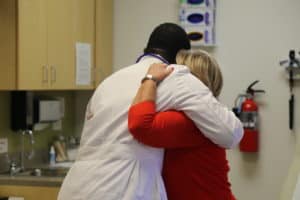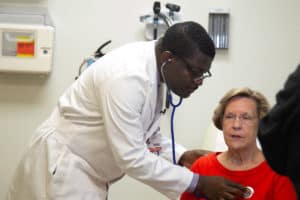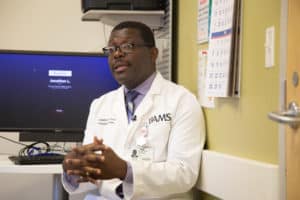View Larger Image

Lowetta Bishop says she's glad she chose UAMS for her cancer treatments.
Colorectal Cancer Patient Says UAMS Saved Her Life
| When a doctor told Lowetta Bishop she had colorectal cancer, she told him he was wrong.
“I’d gone to my family doctor for a regular visit, I told him I’d experienced bleeding, but not often. We both agreed it was probably hemorrhoids,” Bishop said. “We scheduled a colonoscopy and the doctor there told me it was cancer. I couldn’t believe it because I wasn’t even sick! He said, ‘Yes, it is cancer. And it’s bad.’ He told me I likely didn’t have much time left to live.”
That was six years ago. Bishop is cancer-free today. She decided to come to UAMS for treatment, though her physician recommended she go to Houston.
“I’m glad I came here,” she said. “I felt like I was at home the moment I walked through the doors of the Cancer Institute. We haven’t met a person here yet that is anything other than wonderful.”
Bishop is a naturally jolly person. She has an extensive garden at her North Little
Rock home and enjoys decorating, cooking and reading. She’s never met a stranger and is rarely seen without a smile. Every time she sees her surgeon – whether it’s the clinic or the grocery store – she hugs him.
“He saved my life,” she said. “I tell him that every time I see him.”
Jonathan Laryea, M.D. is a board-certified colorectal surgeon at UAMS. He says Bishop’s cancer had not progressed to the point it was untreatable. In Bishop’s surgery, Laryea laparoscopically removed the cancerous part of the rectum and reattached the colon. She wore a temporary protective ileostomy (an artificial opening in the abdomen wall made from the small intestine) which Laryea closed after she finished chemotherapy treatments.
“Colorectal cancer is the third leading cancer diagnosis in men and women in the United States and the second leading cause of cancer deaths,” Laryea said. “It’s very treatable if caught early. Most patients don’t have symptoms, so screening is very important.”
“I tell everyone, ‘Don’t be afraid. Get your colonoscopy,’” Bishop said. “I never thought I needed one because I wasn’t sick. But everyone needs to get one.”
Bishop says several friends and fellow parishioners from her church congregation have been dutiful about scheduling their colonoscopies. She’s even had a few friends who were diagnosed with colorectal cancer and treated at the Winthrop P. Rockefeller Cancer Institute.
The American Cancer Society now recommends that people at average risk of colorectal cancer begin screening at age 45.


